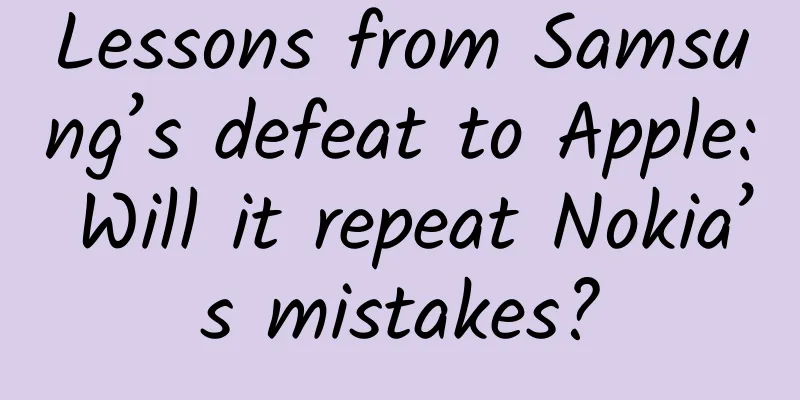Lessons from Samsung’s defeat to Apple: Will it repeat Nokia’s mistakes?

|
On August 1, according to a report from BI Chinese website, Samsung released a worrying quarterly financial report. Samsung's operating profit has declined for the third consecutive quarter. This time, Samsung's operating profit fell by 25% year-on-year. Samsung's performance was mainly dragged down by its mobile business, whose profit fell by 30% year-on-year. However, Apple's operating profit increased by 12% during the same period. Apple does not disclose the operating profit of its iPhone business, but data shows that iPhone sales increased by 9%. Worse still, Samsung's smartphone market share fell to 25.2% in the second quarter, from 32.5% in the same period last year. Apple's market share also fell, but to a lesser extent, from 13.4% to 11.9%. Reuters reported: "Samsung was the only major mobile phone manufacturer to report a decline in shipments in the second quarter." The competition between Samsung and Apple is also known as the first battle of smartphones. Samsung did launch a fierce attack on Apple. When Samsung was at its peak, some people said that Apple would be defeated by Samsung and Android. At present, judging from the data, Apple has won and Samsung has lost. Although Apple CEO Cook has been criticized, he often says "do the right thing". One of our students is the chairman of a domestic kitchen appliance company. He has worked under Cook for many years. What impressed him most was that Cook would ask several questions in a row for all questions, and many executives were often stumped by his questions. Regarding this PK battle between Apple and Samsung, I also want to ask: Why? 1. Samsung’s biggest lesson is the lack of clarity in product categories. Samsung launched two battles simultaneously, and both of these battles were basically defeated. Samsung has two battle lines: one is the high-end mobile phone product line, which is priced similarly to Apple. In the high-end price range, there are basically three factors to compete on: brand and style; craftsmanship; and software experience. Samsung is relatively strong in terms of brand, relying on advertising, but it is relatively weak in terms of style. In terms of craftsmanship and software experience, it is completely defeated. Samsung's other battlefront is low-end mobile phones, which basically compete on three points: performance, price, and software experience. Samsung has encountered strong resistance from Chinese mobile phone manufacturers in the field of low-end mobile phones. Samsung has not achieved perfection in low-end mobile phones. Samsung's performance is good, but it is also far behind in terms of price and software experience. Apple actually has its own low-end mobile phone strategy, which is to sell old Apple phones at very low prices. For example, the Apple iPhone 4 sells for more than 2,000 yuan. 2. Samsung's second lesson is also a big pit that many domestic mobile phones may face, that is, there are sales but no users. I once heard a Samsung executive say that they sell so many mobile phones a year, but they don't know who the users are. This is the most terrifying thing. Without user data, it is difficult to have a fan system, and without fans, there is no future. 3. Samsung's third lesson is its inaction on software, or it has not made the right choice. Samsung currently has two choices: one is to customize its own system (Tizen), which not only avoids the Android licensing fee, but also tailors software for its own hardware, such as the Gear watch, with a simple system and market differentiation. The other is to optimize its own operating system based on the Android platform, just like MIUI, which can also get more support by listening to the voice of users based on its own creativity. But at present, Samsung wants to launch its own Tizen Alliance, but it has repeatedly postponed the release. Samsung's lessons have basically been learned from Nokia. Judging from the current situation, Samsung is basically running wildly along the same path that Nokia once walked through. As a winner of Toutiao's Qingyun Plan and Baijiahao's Bai+ Plan, the 2019 Baidu Digital Author of the Year, the Baijiahao's Most Popular Author in the Technology Field, the 2019 Sogou Technology and Culture Author, and the 2021 Baijiahao Quarterly Influential Creator, he has won many awards, including the 2013 Sohu Best Industry Media Person, the 2015 China New Media Entrepreneurship Competition Beijing Third Place, the 2015 Guangmang Experience Award, the 2015 China New Media Entrepreneurship Competition Finals Third Place, and the 2018 Baidu Dynamic Annual Powerful Celebrity. |
>>: Product application fragmentation increases the difficulty of color TV Internetization
Recommend
Five factors that affect Android app market search rankings
After every app developer completes listing on ma...
NIO envied Tesla and booked the production line of CATL to launch lithium iron phosphate models this year
Recently, the supply chain reported that NIO has ...
E-commerce operations: 9 optimization strategies for product detail pages
For e-commerce websites, the product details page...
Are 400 numbers useful? What are the functions of 400 numbers?
There are two main ways for enterprises to handle...
A comprehensive guide to upgrading private domain traffic
Private domain traffic , relative to public domai...
"Little but smart" - A detailed account of the present and future of super typhoon "Olu"
1. Typhoon Olu Today: Bringing Storms and Rains t...
One-third of children do not get enough sleep. How much sleep do children need in a day?
Just as electronic devices need to be charged, sl...
Monkey stories: The Three Kingdoms of Sichuan golden monkeys
Produced by: Science Popularization China Author:...
Does brand marketing only involve advertising?
When promoting their brands, they should not just...
LCD screen manufacturers are busy with the World Cup big screen, 4K becomes the favorite
As one of the most influential international spor...
How to deal with a website being attacked by Trojans? How to detect if a website is hacked?
As an SEO practitioner, optimizing the website to...
Meituan Operations: The Marketing Logic of Meituan Takeaway Monthly Card
Buy monthly pass at super low price First, let’s ...
The world after the A station crash: What’s the point of calling it a subculture if there’s no fighting?
At 13:33 on the afternoon of August 4, AcFun, the...
Google Tasks launches on Android and iOS
It may not be a secret that Google has its own to...
Yulin Gardening Mini Program investment price inquiry, how much is the Yulin Gardening Mini Program investment price?
Yulin Gardening Mini Program investment promotion...









